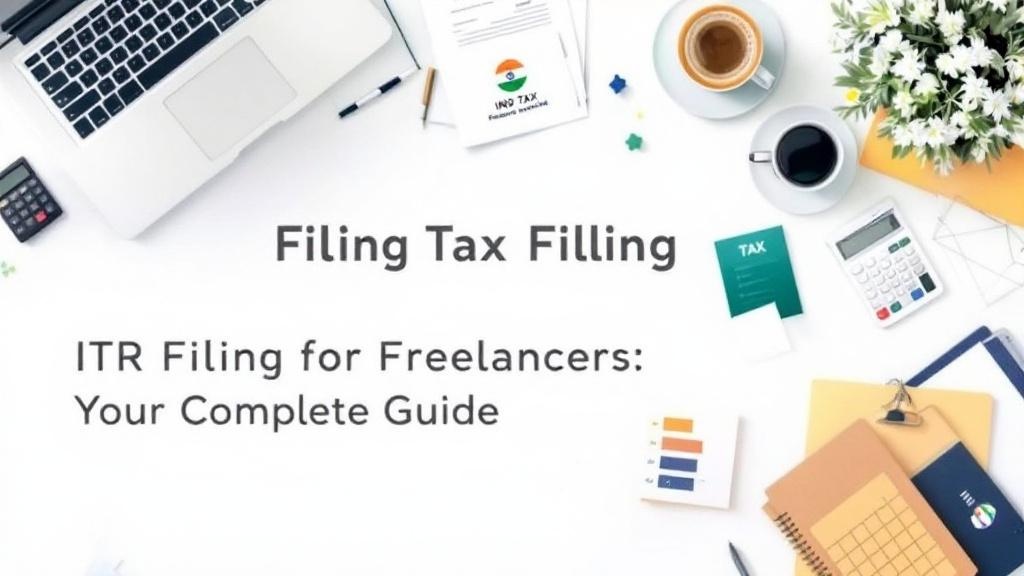Freelancing is no longer just a side hustle; it’s a full-fledged career option for millions of individuals worldwide. Whether you’re a graphic designer, software developer, writer, or consultant, the flexibility and autonomy of ITR filing for freelancers freelancing come with a responsibility: tax filing. In India, freelancers are required to file their Income Tax Returns (ITR) every year just like salaried employees, but the process and requirements are different.
In this guide, we’ll walk you through everything you need to know about from the basics of income tax return for freelancers to step-by-step instructions on how to do it right.
What is ITR Filing for Freelancers?
Income Tax Return (ITR) filing is the process of reporting your annual income and paying the tax due on that income. Freelancers, being self-employed, are responsible for paying taxes based on their income, unlike salaried employees who have taxes deducted at source. In India, freelancer tax filing is governed by the Income Tax Act, 1961, and it’s mandatory for freelancers whose income exceeds the prescribed threshold.
The income generated by freelancers is considered as “business income,” and hence, they need to comply with the freelancers’ income tax rules set by the Income Tax Department.
Why Freelancers Need to File Income Tax Returns in India
Filing ITR is not just about paying taxes; it’s also a way of complying with the law and avoiding legal complications. But there are more reasons why you should file your tax returns as a freelancer:
-
Legal Requirement: Freelancers earning above the prescribed limit are legally bound to file taxes. For FY 2023-24, the threshold for taxable income is ₹2.5 lakh for individuals below 60 years of age.
-
Tax Deductions: Filing ITR allows you to claim deductions that can reduce your taxable income, such as under Section 80C, 80D, or Section 10A.
-
Loan Approval: If you ever plan to take a personal loan or apply for a mortgage, having filed tax returns shows your financial credibility.
-
Avoid Penalties: If you don’t file your ITR on time, you could face penalties or interest on unpaid tax.
Understanding the Tax Filing Process for Freelancers
Step 1: Determine Your Taxable Income
The first step in freelance income tax India is determining how much income you’ve earned in the financial year. Freelancers typically earn from multiple sources—clients, projects, or contracts. Keep a record of all payments you’ve received, as well as any business expenses.
Freelancers’ Taxable Income Includes:
-
Income from freelance work (e.g., design, writing, consulting)
-
Income from side businesses or partnerships
-
Other income such as interest from bank accounts
Step 2: Calculate Your Taxable Income
Once you’ve gathered your total earnings, you need to subtract any business-related expenses such as:
-
Office supplies
-
Internet and phone bills
-
Travel expenses
-
Software or tools for your business
These expenses will be subtracted from your income, lowering your taxable income. Make sure to maintain proper receipts and documentation for all your business expenses to claim them correctly.
Step 3: Choose the Right ITR Form
Freelancers generally need to file ITR-3, which is for individuals earning income through business or profession. The form is relatively straightforward, but make sure you understand the different sections:
-
Income Details: Mention all your freelance income here.
-
Business Expenses: Under Section 44ADA, you can claim 50% of your gross receipts as presumptive income, which simplifies the tax filing process for freelancers.
However, if you are earning only from salaries or other sources of income and have minimal freelance income, you may file using ITR-1 or ITR-2, depending on your situation.
Key Tax Deductions Available for Freelancers in India
Freelancers in India are eligible to claim certain tax deductions that can significantly lower their taxable income. Here are some key deductions available:
-
Section 80C: Deduction for investments in schemes like PPF, ELSS, and life insurance premiums.
-
Section 80D: Deduction for health insurance premiums for self and family.
-
Section 80E: Deduction for education loan interest.
-
Section 10A: Exemption for income earned from export of services.
Additionally, freelancers can claim deductions for expenses related to their freelance business (e.g., work-related travel, office supplies, software licenses).
How to File Income Tax Return as a Freelancer in India
Filing ITR for freelancers is relatively simple if you follow the right steps. Here’s a step-by-step guide:
Step 1: Gather All Financial Documents
Before you start the filing process, ensure you have all the necessary documents, including:
-
Income details: Invoices, payment receipts, and contracts.
-
Expense receipts: Bills for business expenses.
-
Bank statements: To track income and expenditures.
Step 2: Register or Log into the Income Tax Portal
Visit the Income Tax Department website and log into your account. If you don’t have an account, create one by entering your PAN details and other required information.
Step 3: Choose the Correct ITR Form
Select the appropriate form (usually ITR-3) based on your income sources. The form will require you to enter detailed information about your freelance income and expenses.
Step 4: Fill in the Details
Enter your income, business expenses, and any other relevant information. Don’t forget to claim all possible deductions like those under Section 80C or 80D.
Step 5: Submit the Form
After reviewing the form, submit it online. Once filed, you’ll receive an acknowledgment receipt.
Step 6: Pay Tax (if applicable)
If you owe any taxes, you will need to pay them. The website provides payment options like net banking or debit/credit cards.
Best Way to File ITR for Freelancers Online
The best way to file ITR for freelancers online is to use the official Income Tax e-filing portal or consult with a tax consultant if the process feels overwhelming. The online portal is user-friendly, and most forms are pre-filled with basic details (if you’ve filed before), making the process quicker.
For freelancers with more complex returns, professional assistance may be a good idea. A tax expert can guide you through the process and help optimize your deductions.
Frequently Asked Questions (FAQs)
1. Do freelancers need to file ITR every year?
Yes, freelancers need to file their ITR every year if their income exceeds the basic exemption limit. Even if your income is below the threshold, filing helps keep your financial records clear.
2. What is the best way to file ITR for freelancers online?
The best way is to use the official Income Tax Department’s e-filing portal. Alternatively, you can use tax filing platforms like ClearTax or Tax2win that offer guided services for freelancers.
3. How can I claim deductions as a freelancer?
Freelancers can claim deductions for business-related expenses such as office rent, internet bills, software, and travel expenses. You can also claim deductions under sections like 80C, 80D, etc., for investments and insurance.
4. How do I file income tax returns as a freelancer in India?
You can file your ITR by logging into the official Income Tax e-filing portal, selecting the correct form (ITR-3), filling in your income and expenses, and submitting the form online.
5. What is the due date for ITR filing for freelancers in India?
The due date for filing ITR for freelancers is typically July 31st of the assessment year. However, it can be extended based on government notifications.
6. Can I file ITR without any professional help?
Yes, if your finances are straightforward, you can file ITR independently using the online portal. However, for complicated situations, such as significant expenses or multiple income sources, it’s recommended to consult a tax professional.








Comments (0)